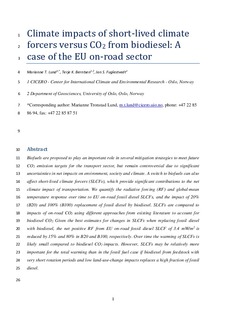Climate impacts of short-lived climate forcers versus CO2 from biodiesel: A case of the EU on-road sector
Peer reviewed, Journal article
Submitted version
Permanent lenke
http://hdl.handle.net/11250/2486963Utgivelsesdato
2014Metadata
Vis full innførselSamlinger
- Journal articles [478]
Sammendrag
Biofuels are proposed to play an important role in several mitigation strategies to meet future CO2 emission targets for the transport sector but remain controversial due to significant uncertainties in net impacts on environment, society, and climate. A switch to biofuels can also affect short-lived climate forcers (SLCFs), which provide significant contributions to the net climate impact of transportation. We quantify the radiative forcing (RF) and global-mean temperature response over time to EU on-road fossil diesel SLCFs and the impact of 20% (B20) and 100% (B100) replacement of fossil diesel by biodiesel. SLCFs are compared to impacts of on-road CO2 using different approaches from existing literature to account for biodiesel CO2. Given the best estimates for changes in emissions when replacing fossil diesel with biodiesel, the net positive RF from EU on-road fossil diesel SLCFs of 3.4 mW/m2 is reduced by 15% and 80% in B20 and B100, respectively. Over time the warming of SLCFs is likely small compared to biodiesel CO2 impacts. However, SLCFs may be relatively more important for the total warming than in the fossil fuel case if biodiesel from feedstock with very short rotation periods and low land-use-change impacts replaces a high fraction of fossil diesel.
